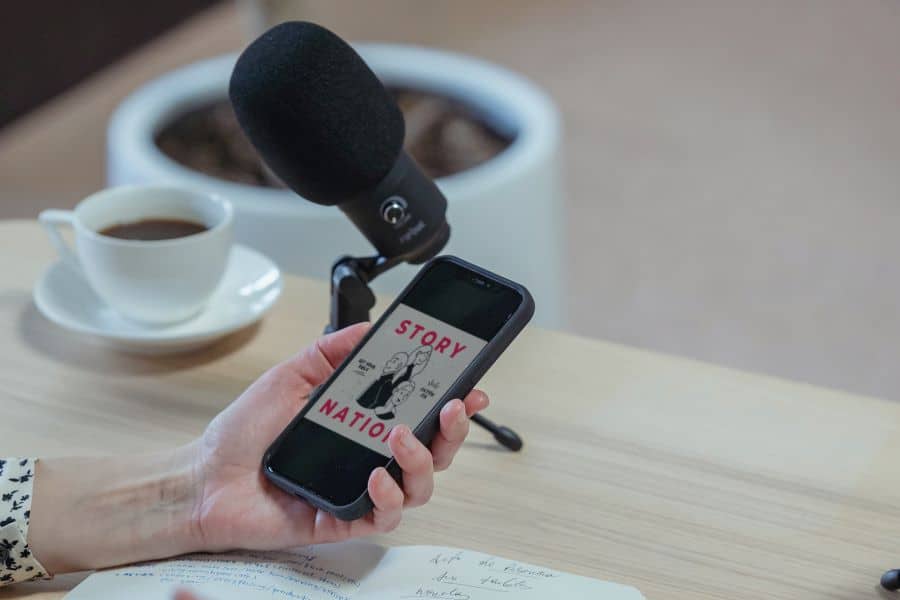The average podcast uses about 70 MB of data. Listeners who prefer the highest-quality streams typically experience approximately 120 MB per hour of data use.
That’s comparable to streaming music files. Some platforms, such as Spotify, can reach even higher use levels.
Whether a podcast uses a lot of data or not is highly subjective. If someone is on an unlimited plan, they don’t usually think about the information transfer. At worst, the streaming speed might get throttled during high-use times.
When you have caps on how much data you can use each month, this information matters if you’re getting close to your limit.
Related: 10 Best Podcast Apps for your Listening Pleasure.
Contents
What Does Data Use Matter for Podcasts?
Mobile data provides Internet access without requiring a secure Wi-Fi signal. An application that typically requires this connection type counts as data use.
Streaming a podcast from a browser or an app eats into a mobile plan’s data allowance.
Some residential Internet Service Providers (ISPs) place caps on how much data is allowed per month. Streaming a podcast for an hour would count against that figure based on the quality of the stream produced.
If you don’t have caps, data use matters for the podcast quality. Bigger files provide a higher audio resolution to enjoy.
Here is a summary of the most common sample rates and channel configurations.
| Format | Container Type | Audio Minimum | Recommended Audio |
| PCM | WAV | 44.1 kHz sampling rate with 16- or 24-bit resolution | 192 kHz with 24-bit resolution |
| FLAC | FLAC | 44.1 kHz sampling rate with 16- or 24-bit resolution | 192 kHz with 24-bit resolution |
| MP3 Stereo | MP3 | 44.1 kHz sampling rate with 64 kbps bit rate | 48 kHz with 128-256 kbps |
| MP3 Mono | MP3 | 44.1 kHz sampling rate with 32 kbps bit rate | 48 kHz with 96-128 kbps |
Anyone concerned about how much data they’re using when listening to a podcast would want to use the lowest rates possible for their preferred container type.
Can I Listen to Podcasts Without Using Data?
All file transfers require data. You’re still eating into your caps even if you decide to download a podcast before listening to it.
You can listen to podcasts without using mobile data. Here are the steps to follow to achieve that outcome.
- Switch your mobile device to a Wi-Fi network.
- Download the podcast to your smartphone or tablet.
- Access the file when you’re ready to start listening.
If you have residential or business Internet caps with your Wi-Fi service, the file download would still count against those figures. Playing the podcast after the download would not count against your mobile data.
How Can I Limit Data Use When Listening to Podcasts?
The audio quality and time spent streaming largely determine the amount of data used.
It is possible to cap the audio quality of a podcast during the initial export. It’ll be smaller if you bounce it at MP3 stereo or mono because of the lossy file compression.
That means the format quality is lower, reducing the data required to listen to it.
Lossless file compression uses larger file sizes. A WAV audio file delivers the best listening results while providing the biggest charge against your data caps.
Regardless of the file format, you still have the option to adjust the podcast quality to MP3 to keep data use at a minimum.
Why Do Podcasts Use So Much Storage?
Podcast apps often automatically download the next episode of the podcasts to which you subscribe. Those files get stored on your device for convenience, but it can strain the storage capacity of 16 GB smartphones and tablets.
If you need to free up storage space, try deleting the podcast files you’ve already heard. You’ll have more room without using your data.
You also can use a cloud-based service to hold your podcast files. Transferring them would use mobile data, so it works better for capped users to wait until a Wi-Fi connection is available.
In Conclusion: Do Podcasts Use a Lot of Data?
Podcasts use a comparable amount of data to music files, which can be up to about 150 MB per hour. If you were to stream a 4K movie, you’d use an average of 7.2 GB per hour.
That means you could listen to 96 one-hour podcasts for the same data charge as a two-hour 4K movie.
The best way to maximize your listening enjoyment for those on limited mobile data plans would be to connect to a public or uncapped Wi-Fi network to download the podcast file. You could listen to it at your convenience without worrying about reaching a use limit.
